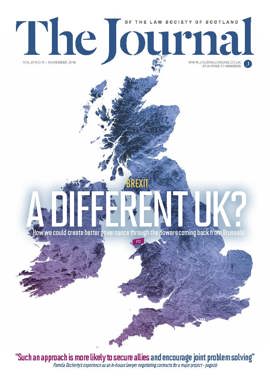President's column

A key theme of the last month has been around the profession and new technology and its impact on the profession. I was struck by the opportunities (and challenges) that technology offers at the Council of European Law Societies and Bar Associations (CCBE) conference, Innovation and the Future of the Legal Profession, which I attended at the end of October.
The science fiction writer William Gibson observed: “The future is already here – it’s just not evenly distributed.” From online court processes to legal artificial intelligences such as Ross AI – built from Watson, the IBM supercomputer, and a solution currently available on the market – technology is transforming all aspects of legal practice. The discussion at the conference made it clear that the challenges and opportunities that these new legal technologies raise are shared by legal professionals across Europe. Indeed, it is the very nature of these new solutions that they can transfer or operate across borders.
One of the most inspiring sessions at the conference was the presentation from the past President of the Association of International Young Lawyers (AIJA), who outlined the findings of a joint research paper between the AIJA and the International Bar Association. This highlighted that it may indeed be the profession holding itself back rather than a lack of market-ready legal technology. From shopping to videoconferencing, appointment booking to crowd-sourcing information, younger generations are already in their day-to-day lives using technology that the justice system is starting to deploy. There may be potential for firms to include their staff, who may be more tech savvy than their more experienced colleagues, in horizon scanning and business planning, as well as the scope for alternative business structures (ABS) to reward and incentivise those from a technology background that can help firms and their business models to transform.
Technology was also the theme of two presentations to our Council at the end of October. We heard from Tim Barraclough from Scottish Courts & Tribunals Service about the Criminal Evidence and Procedure Review. Work around possible models of recording and storing evidence at a far earlier stage is progressing, looking to deliver efficiency savings to courts and to improve the experience for victims and witnesses in the criminal justice system, while maintaining safeguards for accused persons. This could change the nature of criminal proceedings in Scotland, making them less reliant on an adversarial system, and also change the ways in which firms structure their work and business models. Whether the solutions being prototyped come to pass – and the resources to develop this technology may be an inhibitor – we are keen to reflect the views of the profession as thinking develops.
A second presentation was from the Scottish Business Resilience Centre (SBRC) on cybersecurity. This is a rapidly developing concern for the legal profession in Scotland, for its clients, and for us all as individuals. Cybercrime has recently become the most reported type of crime in Scotland, though its perpetrators may operate from far overseas. This presentation included a number of practical tips for law firms: ensuring that cybercrime is reported to the police through the 101 number, not paying bitcoin ransoms which only encourage the spread of cybercrime, finding help and funding through business gateways to develop resilience against cybercrime, and also developing business recovery plans.
The SRBC were also among presenters at last month’s technology and cybercrime conference which the Society held in Glasgow. The healthy turnout at that event and the interest it, along with the Society’s first technology audit report, generated online serve to further prove that technology is very much on the radar of Scotland’s legal profession.
In this issue
- Insider lists: the new must-do
- Pensions valuation and the “relevant date”
- Data: blurring the lines between privacy and risk?
- IT: the proficiency and the gaps
- Reading for pleasure
- Opinion: Peter Boyd
- Book reviews
- Profile
- President's column
- The Keeper steps in
- People on the move
- Beyond Yes and No: Britain after Brexit
- Brexit: leaving European judicial space
- Timed out? Alternative financial claims by cohabitants
- The end of the cash ISA?
- We need to talk about Beatrice
- Global players
- Digital: the dark side
- Cautionary tale
- Married to the land? – appealed
- Pregnancy: the unequal burden
- Privacy: strictures and safeguards
- Trapped employers – relief any time soon?
- Scottish Solicitors' Discipline Tribunal
- Convenient, but necessary?
- Is there a lawyer in the house?
- From the Brussels Office
- Law reform roundup
- Master Policy: the new team moves in
- The "buzz" of mediation
- Plan into action
- Sorry: the hardest word, made easier
- Ask Ash
- Appraising: what's your score?
- Paralegal pointers






